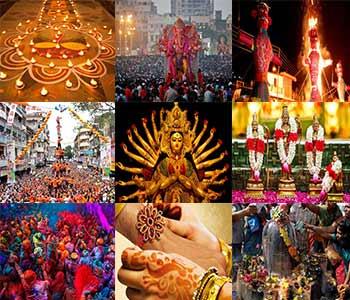|
Hindu festivals nurture the personal bonding among different members of the joint family. Unlike mechanical western system of designating one day for a particular relation of the family member, Hindu festivals have religious, spiritual, social and economic importance. They have a very strong foundation which enhances the bonding of the relations. Western countries have designated different dates for different relations – Baby Day (May 2nd), Brother & sister day (May 2nd), Parents day (as per UNO - June 1), Father Day (various dates), Mother Day (various dates), Brother Day (May 24th), Sisters Day (first Sunday of August), Son & daughter day (August 11th), Children Day (November 20th), Husband appreciation day (third Saturday of April), Wife appreciation day (third Sunday of September), Grandparents Day (various dates), Family Day (May 15th), Father-in-Law Day (July 30th), Mother-in-Law Day (fourth Sunday of October), Son-in-Law Day (April 10th), Aunt & Uncle Day, Cousins Day (July 24th), Daughter-in-Law Day, etc. Every Hindu festival celebration centre around the rituals of prayer, fasting and seeking of blessings, and involves the decoration of homes, wearing of new clothes, music, dancing, and feasting. Hindu Festivals are many and celebrated for different relations. Under the influence of western culture, Hindus are gradually forgetting or ignoring the celebration of these festivals. The purpose of this article is to remind about the rich Hindu culture and festivals.
Tulsi Marriage festival is celebrated on Ekadashi of Shukla Paksha of Kartika month (November-December). On this day, marriage of Tulsi plant with Shaligram is performed. By worshipping them, Lord Vishnu and Lakshmi ji are made happy and this increases prosperity and happiness at home.
Vat Savitri fast is famous by the name of Vat Savitri due to the ritual of worshiping the Vat tree and remembering the story of Savitri-Satyavan. Worshiping the banyan tree for the longevity of the husband became a part of this fast. Women perform fast-worship along with Katha Karma and wrap threads of cotton around the Vat tree during the circumambulation. It is considered to give good luck and help in the attainment of children. There are different opinions regarding the date of this fast. According to Skanda Purana and Bhavishyottara Purana, there is a law to observe this fast on the full moon day of Shukla Paksha of Jyeshtha month, while according to Niyasamrit etc., it has been said to fast on Amavasya of Jyeshtha month.
Ahoi Ashtami fast is celebrated on the eighth day of Kartik Krishna Paksha (November-December). Mothers keep fast throughout the day for the long life and happy life of their son. During the fasting of Ahoi Ashtami, Hoi is worshiped when the stars are visible in the evening. Arghya is also offered to the stars. This hoi is made on the wall or it is hung on the wall at the time of worship after wrapping hoi on a thick cloth.
0 Comments
|
Archives
March 2022
Categories |

 RSS Feed
RSS Feed